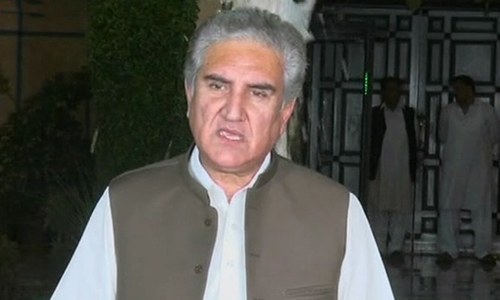WASHINGTON: As the United States and the new Pakistani government prepare for their first face-to-face talks in Islamabad on Wednesday, the Trump administration has made it clear that Pakistan will have to back the US strategy in Afghanistan if it wants good relations with Washington.
The strategy — as defined by both the State Department and the Pentagon this week — is to use a combination of military and diplomatic pressures to force the Taliban to work with Kabul for restoring peace in Afghanistan.
Washington believes that a working relationship between the Taliban and Kabul can lead to an honourable withdrawal of US troops from Afghanistan.
Washington sent its first clear message to Islamabad last week when US Secretary of State Michael Pompeo telephoned Prime Minister Imran Khan and asked the latter to take “decisive action against all terrorists operating in Pakistan”.
Initially, Islamabad disputed the US version of this conversation, but later withdrew its objection.
The second message came earlier last week when US Defence Secretary James Mattis said at a news briefing in Washington that Secretary Pompeo and the US military chief were going to Islamabad to urge Pakistan to play its role in fighting terrorists.
Official underlines importance of Islamabad’s help in encouraging Afghan Taliban to come to negotiating table
Then on Saturday, the Pentagon announced that it was seeking to reallocate $300 million in aid to Pakistan due to Islamabad’s lack of “decisive actions” in support of America’s Afghan strategy.
But so far, the most detailed explanation of the US terms of engagement came from a senior Pentagon official — Assistant Secretary of Defence for Asian and Pacific Security Affairs Randall G. Schriver.
In his talk at the Carnegie Endowment for International Peace, Washington, Mr Schriver emphasised several key points: no restoration of US security assistance to Pakistan before the war in Afghanistan ends, more restrictions may be imposed and Washington has serious concerns about Pakistan’s growing economic ties with China.
But he also said that the Trump administration was willing to give Imran Khan and his team some “space” to make their policies.
“In terms of separating what was said during a campaign and what he said since the election, we want to give him (Mr Khan) space to find the opportunities to improve things with India,” he said.
Mr Schriver also dispelled the perception that Washington was trying to destabilise Pakistan.
“We are not interested in a failed Pakistan by any stretch of the imagination. So, we want them to be successful,” said the top US official while indicating that Washington could also work with international financial institutions to help boost the ailing Pakistani economy because “economy is going to be the key” to Pakistan’s success.
In earlier statements, US officials had indicated that they might not support Pakistan’s bid to seek an estimated $12 billion from the International Monetary Fund until what they said Islamabad stopped supporting certain Taliban groups in Afghanistan.
Mr Schriver not only offered conditional support to Pakistan’s efforts to seek international or bilateral loans, but also acknowledged the key role that Islamabad has to play in bringing the Taliban to the negotiating table.
“There is no question we need Pakistan’s help in encouraging, persuading, pressuring Taliban to come to the negotiating table, deal with the national unity government under President Ghani and talk about a future where they are included, not through force, but through a political process,” he said.
He defended the Trump administration’s decision to suspend security and certain economic assistance to Pakistan, saying: “We have made decisions on curbing assistance and putting constraints on our relationship with Pakistan as a means to try to persuade them to adopt that course and use their influence on the Taliban.”
But such decisions were regularly evaluated, he added.
“We are still evaluating as to the impact of that. It’s certainly not where we want it to be. But it’s something that, I think, we will stick with and certainly the end stage should be one that we can all agree on,” he said.
Mr Schriver also said that the US was not yet ready to resume its assistance to Pakistan.
“I think our approach of cutting assistance and pressuring Pakistan on their relationship with the Taliban — persuading them to come to the table, dealing with terrorist networks — will be sustained,” he said. “It is a matter of dealing with suspicions and distrust and the mix of all this.”
Explaining why the Trump administration wanted to end the Afghan war now, Mr Schriver said: “Seventeen years is long enough to be involved in a war. We need this to end. We want this to end.”
Responding to a question about the Pakistani economy, Mr Schriver said: “I don’t have a good answer on the economic difficulties and challenges that Pakistan finds itself in. What I can say is, if you look at other examples where countries went all-in or largely-in with China, the results have not been particularly good. There has been an erosion of sovereignty and an erosion of control. There are many examples of that.”
The US, he said, was willing to help Pakistan.
“So, if our friends in Pakistan want to talk about a way out of that or want to talk about ways to strengthen their economy and deal with that, I am sure we would be open to that in trying to work with Pakistan — bilaterally or through international institutions — to try to get them on a better path,” he said.
Published in Dawn, September 3rd, 2018































